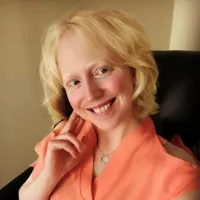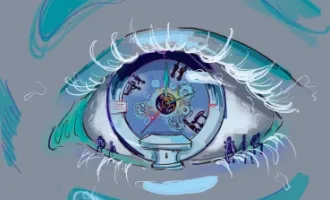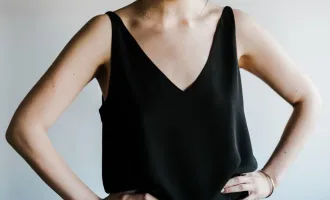
Image by wirestock on Freepik.
Don't Walk on the Grass
“Don’t walk on the grass. Only Fellows can walk on the grass,” Asif warns us, unserious. I puncture the steadfast walls of immaculate stone, climbing through a tiny doorway punched out of the massive wooden gates a foot off the ground. The air is thick with the mist that bathed our walk from the Mathematics Institute.
I see Eleni walk up to the perfectly manicured lawn and defiantly plant her foot down. Nothing happens.
Magdalen College sprawls past the river bordering central Oxford. We walk over a small wooden bridge to a gravel trail encircling one of the College’s two deer parks. The walk is lined with bright yellow flowers, eerie spots of color. Eleni is surprised they are so well-preserved: at Cambridge, the undergraduates usually leave none standing.
As the blooms sway in the wind and the water meanders past, I lose myself in gentleness. My body dissolves. Arms, legs, eyes and skin are not my own, and my consciousness — pure heat and electricity — spans across moments, heavy with history and place.
I see Oscar Wilde walk down the steps from his accommodation and stroll through the deer park on an April afternoon like this one, awash in quiet melancholy, the vastness of gray sky and green lawn. The green is strange for this Californian, acclimated to the yellows and browns of drought. I see all around me the billowing robes of 15th century Bible scholars — the College is new, and so many pages are yet-unwritten.
My scattered shards of self shear and shatter in time's turbulence. I wonder where I am. I turn my head: the group is on to the next attraction, back toward the courtyard, the central artery between the dining hall, the common rooms, and the like.
“I feel like we have to make a bet here, now; what should it be?” Nader echoes from beyond the entryway, unanswered. We pass through the College’s ancient walkways — past rows of intricate arches, cramped doorways, shadowy corridors leading up toward faculty offices and classrooms for tutorials.
At the front, Asif turns a corner and heads up a couple flights of narrow stairs, past a sign reading “Senior Common Room.” He swipes his badge at the door, which clicks open after a foreboding delay. The five of us enter, passing rows of long black robes and brightly colored hoods.
We gather beside a low, backless chair, awkwardly stationed by the nearest window looking out onto the courtyard. The chair is unadorned except for a small sliding weight on the left arm — a balance.
On the windowsill is a leather-bound ledger filled with dozens of dates, names, and weights in stones and pounds. Asif, our impromptu historian, points to an entry: “Edwin Schrödinger,” it reads.
“This was his first High Table dinner here, his induction as a Fellow,” we are told. “Right before, from that phone”— he points to a 1930s telephone hanging on the wall — “they got the call that he had won the Nobel Prize.”
I walk to a plexiglass case across the room, below a tapestry older than the Constitution. On the bottom shelf is a tasteful arrangement of four 18th-century flintlock pistols; above them sits a small jewelry case holding a beautifully polished Nobel. (“Not Schrödinger’s,” I’m told.)
One by one, the others sit in the chair, reading off their weights in those awkward British units. On my turn, I stare into the brown leather upholstery, and feel nothing but tension. I decline; it is an honor I haven’t earned.
Nader has settled on a bet now. “How about: In five years, ‘many-worlds’ will be the dominant quantum interpretation.”
“I’d take that bet,” Asif responds, smiling wryly, perusing an ancient dissertation pulled from a bookshelf.
“Oh yeah? How will you measure that?” Gabriel is characteristically blunt, through his thick Portuguese accent.
“I guess when Jim says it’s true.” Nader chuckles; then, the four physics grad students all start laughing. Jim will never say it’s true.
I met Jim the day before in a spotless seminar room in the Wiles building, conspicuously beautiful for a math department. He was confident — perhaps overly so, perhaps not — that “language does not live on a line”.
Meaning — a yarn ball of strings and boxes, concepts and relationships — seems vastly bigger than the jumble of symbols we throw around at each other. I wonder now if mind does not live on a line, either. Perhaps the focus of this conference — the mathematics of consciousness — is missing the point too, settling for the shiny veneer to avoid the boundless ocean beneath.
But then I remember my own sloppy anarchism, my fear of groups of more than four people. I wonder where my distaste for this enterprise really comes from.
We never settle on terms for the bet. Instead, we walk outside toward the outskirts of town in search of some decent — non-British — food. Eleni is 21 and doing her second master’s; she tells me that the most pressing concern for humanity is to end death.
She strategizes about transitioning from quantum theory to neuroscience, about unlocking the secrets of immortality. I recall my own stint with transhumanism — a dinner at a kitschy diner in Baltimore with Aubrey de Grey and a few giddy philosophy majors, a plastic baby staring down at us from the technicolor ceiling.
What happened to that passion? I think. End death — that’s a real goal.
I am in that cold Maryland December twelve years ago — a late night in the library, huffing espresso fumes to force myself awake, flailing feverishly to get a brain decoder working to impress the grad student supervising me.
The blue fluorescents and vomit-colored carpet in the windowless basement stacks tinge pixelated traces of a patient’s hand position, squiggling back and forth in a Matlab figure window. I feel like solving this will solve everything.
The sun has set on the narrow, wet Oxford street. In twelve years, my ambition has sunk to mocking Andrew Huberman's three-hour pitch for testosterone-enhancing yerba mate, self-righteously sipping tequila-sodas at my neighborhood haunt. But then again, I remind myself, I quite like that ritual.
We settle on a Persian place. They close in 15 minutes, but the staff are too polite not to seat us. As the drinks and appetizers come out, Gabriel looks over to me and asks, “So, how about you. What’s your metaphysics?”
“I’m an idealist,” I tell him, taking a sip of tea. The four look at each other.
“Really?” Asif asks, incredulous, his teeth showing through a broad smile.
“Alright. Sell it to me, then.” Gabriel is deadpan, gesturing to me with both arms.
“Well, I don’t know if it’s right. But it’s nice to think about.”
Gabriel looks off to the side and upward toward the ceiling moldings. He scratches his chin, then looks straight into me. “So what then, material reality is … correlations in experience structure, or something?” I enjoy the way he says “correlations”, wiggling his fingers together to illustrate.
“More or less, yeah.” The waitstaff start stacking chairs on the other tables.
Gabriel purses his lips and nods a little. “Interesting …” he trails off. Our lamb platters arrive, barely squeezing onto the thin table. Then the group asks me what’s up with Americans and guns.
* * *
“Looks good; Dr. A will be in to see you in a minute,” the technician says, pulling the blood pressure cuff off my arm.
I double-check that I have everything. My turquoise journal is open next to me, “Session 26” scrawled at the top of the page. I unlock my phone; up pops the article I was reading on the Muni over:
“Under basal conditions, activation of cortical extra-synaptic GluN2B-selective NMDARs acts through the mTOR signaling pathway to suppress protein synthesis, which maintains synaptic homeostasis …”
I dismiss the word salad and open Spotify instead. Muscle memory takes over: gear, playback, 12 second crossfade. Library, “KAP IM Session 3”—downloaded. Play, pause. Shuffle on, off, on, off.
The doctor comes in, and after a brief chat about my travels, he hands me the first spray. I blow my nose, lean back, and snort the meds — right nostril first, then left. I recognize the subtle metallic taste of the ketamine in the back of my throat; these days, it’s more of a comfort than a nuisance.
I think back to the intention I had written in my journal. The trip had been hard — God, that first night in London.
I am back, alone, lying in my tiny Airbnb, walls spray-painted with gold Rustoleum. In memory, I am half-dreaming, looking up from the twin bed filling the room at the shadow of a seven-year-old child, a haze in scattered light from a clip-on LED desk lamp.
I can feel his foot pressing my face into the dirt at the edge of the schoolyard. I know he knows no one can see. I see myself from outside, alone in the shimmering darkness, wandering through my pocket universe.
I watch myself get up and walk down the quiet Islignton backstreet to the nearest bodega, lodged in the negative space between a cafe and an auto repair shop. I ask the clerk for a vape pen; he points wordlessly to the dizzying rainbow of flavors behind him, distracted by something happening on a head-sized CRT television crammed into a haphazard shelf.
“I have no idea, man; whatever people seem to like,” I tell him. He smiles, pulls one down, and hands it to me. Watermelon. I roll my eyes toward the cool fluorescents and fork over the foreign plastic money. I walk down to the canal by myself, leaving behind only a cloud of horrific flavor floating past the houseboats, backlit by yellow sodium streetlamps.
My mind is brought back to the office as the doctor hands me the second spray. On the far wall I notice the familiar, comically small print of a snow-capped mountain, lit in pink-purple alpenglow.
But I didn’t fall apart. I plug my left nostril. I loved that trip.
It had felt to me like being in those first uneasy talks about Hilbert spaces in quantum mechanics a hundred years ago. I sniff in. It is so early now — before history has broken the symmetry, setting us down one path, free but predetermined. I sniff in the other nostril. I recall that the last year of treatment has been during my Saturn return.
Saturn, the Old One, melancholy from the weight and the guilt of history. Saturn — wise in suffering, gold transmuted from lead. Saturn does not seek to end death; Saturn sees death for what it is.
The doctor leaves. I turn off the light, put my headphones on, and lay down in the massive chair. I close my eyes. This time, I see only swirling silhouettes; I wonder if perhaps I’m finally developing a tolerance. The come-on is gradual. But then it is sudden, and all at once, I’m undeniably in it.
I see a shard of light, which I think must be a living cell, dividing in two. As the sister shards squirm and separate, they remain connected; I see their trajectories in spacetime, rotated and sliced through a different axis. I watch the eons of evolution unfold in form, connected and whole. Immobilized by ketamine, I relinquish a thin smile at the geometry of Darwin.
Lying there in the clinic, I walk into a clearing surrounded by wide trees. It is deep night, so dark that I can see every star in the Milky Way — the traces left over from that Tree of Life, enshrouded in clouds of purple. As I kneel in the tall grass, a ray of light passes through my pineal gland.
Not cells. Ideas.
There! — in Orion's belt, I see the birth of Beethoven’s 5th, a supernova condensing into a star-lineage that extends far beyond the angular resolution of the Sight behind my eyelids. I look around me, out into that awesome web of crystalline light piercing the infinite black. I am awash in fire.
“God,” I say to myself, and reach for the gold Möbius strip hanging from my neck. “My God.”



